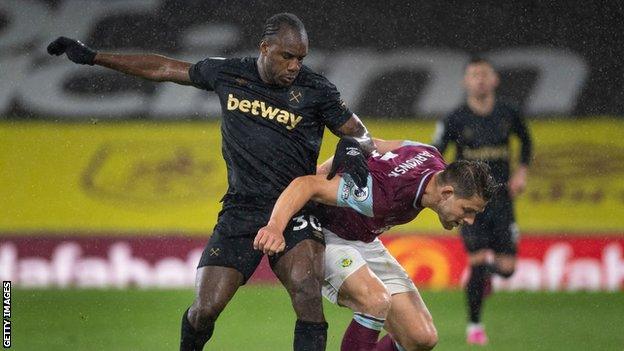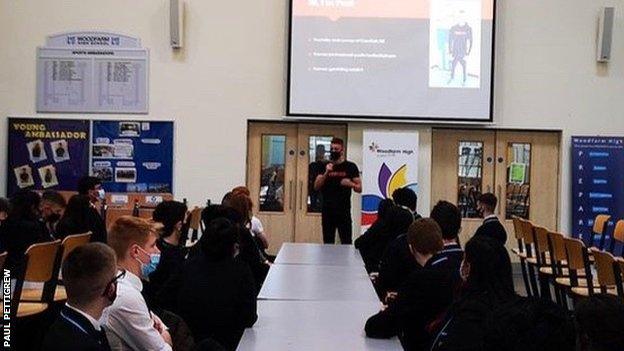Betting in football: Could a gambling sponsorship ban ruin clubs?
- Published

West Ham and Burnley are two of eight Premier League teams to have gambling sponsorships on their shirts
Former footballer and gambler Paul Pettigrew, who talks to school children about the dangers of betting, says he recently asked a class of 15-year-olds how many firms they knew of - and they replied with 13 different names.
As the former Morton player, who lost £32,000 by the age of 19, says: "The advertising works - 100%."
The UK government is considering whether to ban gambling sponsorship in football as part of its review of the Gambling Act, but English Football League chairman Rick Parry says such a ruling could cause some of its 72 clubs "to go under".
He also told BBC Sport that as part of the EFL's submission to the review, it commissioned research that suggests there is "no evidence" advertising increases the number of problem gamblers, of which there are 245,000 in England according to a 2018 study by NHS Digital.
Campaigners, who want an end to betting sponsorship in football, have questioned that claim and say adverts are ubiquitous, target vulnerable gamblers and normalise the practice for children.
How damaging could a ban be to clubs? And is it possible to strike a happy medium?
What is gambling sponsorship worth to teams?
Parry says a gambling sponsorship ban would cost the EFL, which is sponsored by Sky Bet, £40m a year in lost revenue. He has warned that the pandemic had left a "£250m hole", external in clubs' finances based on gate receipts alone.
This is particularly apparent for shirt sponsorship where teams in the lower reaches of the Premier League or the Championship are offered more money by gambling firms than alternative brands.
One club director told BBC Sport that can amount to another £5m or £6m a season. West Ham's shirt deal with Betway is worth £10m a season, the most lucrative gambling sponsorship deal in the top flight.
The director of the Championship club, speaking anonymously, admitted he was "desperate" to move away from having a betting sponsor on their shirts because of the club's values. But he said the difference in income could fund the purchase of an extra player and justifying the alternative to his owners would prove difficult, especially after a year without crowds.
"If we are talking multi-million pounds less over the course of a contract, it does add up," he said.
Parry said: "At the margins, a betting sponsorship ban could be the difference between some clubs going under or not. It's not easy finding new sponsors at the moment."
Shirt sponsorship is only part of the story, however.
In the Premier League, eight clubs have betting firms on their shirts but 17 have betting partners, which advertise around the pitch, on training kit and on social media. In the Championship, 10 of 24 clubs have shirt sponsorships but that number also increases when partners are considered.
That is why the EFL - among others - is lobbying the government to try to prevent a blanket ban - and believes it has a strong case.

Paul Pettigrew says: "Clubs not being allowed gambling sponsors on kids' shirts almost admits there is something wrong."
The moral argument
As part of its submission to the Gambling Act review, the EFL commissioned what it claims is "independent" research by Professor Ian McHale at the University of Liverpool.
Parry says McHale found gambling participation in sport had remained flat at about 9% of the population between 2010 and 2018 and that, over the same period, the rate of problem gambling in sports had halved from 6% to 3%.
"I'm not saying 3% is an acceptable number or should be ignored," Parry told BBC Sport. "But the point is that the rate of problem gambling in relation to sports betting has significantly reduced."
The Big Step, a campaign group which wants a ban, says the research should not be classed as independent given the EFL's agenda and says problem gambling figures are often inaccurate.
Yet the Gambling Commission, which regulates the industry, says its latest figures show a drop in problem gamblers in England, although it warned they could be skewed because of Covid-related reasons.
Parry added: "Rather than saying there should be a blanket ban on commercial arrangements, maybe it's much more relevant to say, if there are issues with the volume of advertising, if there are issues with the use of social media, and, for example, getting sportsmen to endorse betting, then that can be addressed. I think that it's much better to address those problems if we're involved."
Pettigrew, who set up his own charity GamTalk to talk to children about gambling, also believes the number of adverts should be reduced.
"Football is the national sport and the adverts have been subconsciously ingrained into kids from a young age," he said. "They are bright and colourful and catch your eye.
"I'm a football fan as well and the last thing I want to see is any clubs going under, but there are plenty of other sponsors they could get.
"Clubs are already not allowed gambling sponsors on kids' shirts, which almost admits there is something wrong."
'Football can wean itself off gambling money'
Tranmere Rovers chairman Mark Palios believes "football can wean itself off" gambling revenue.
The League Two club is one of many in English football - including Chelsea, Liverpool, Sheffield United, Luton and Forest Green Rovers - not to have betting sponsors.
He told a parliamentary group which discussed football's relationship with betting in March: "In our case, shirt sponsorship income might be £100,000 in a budget of £1.5m, so it's not massive and it's not a zero-sum game. Clubs can find other sponsors to replace what they have already."
In the same discussion, Palios also suggested that part of the problem was down to "a thirst to spend money" because "player wages are out of control".
Parry agrees about football's sustainability, but does not think football has become over-reliant on gambling money to the point it ignores the dangers associated with the industry.
"If you look at the Championship for example, repeatedly over the last decade, wages have been more than 100% of turnover," he said.
"That clearly is not sustainable and we are looking to address that, but I don't think it demonstrates in any way that we are over-dependent on gambling or one particular sector.
"It wasn't us that liberalised the gambling market and caused the explosion of internet betting, it was the 2005 Gambling Act.
"Our submission to government, we believe, is very robust, we believe that the evidence is robust, and we believe that there is no logic behind the blanket ban."

'The UK is all I've ever known': Panorama looks at the impact of immigration status on those born or raised in Britain
Wild Weekends: Three youngsters embark on the wildest activities Scotland has to offer
